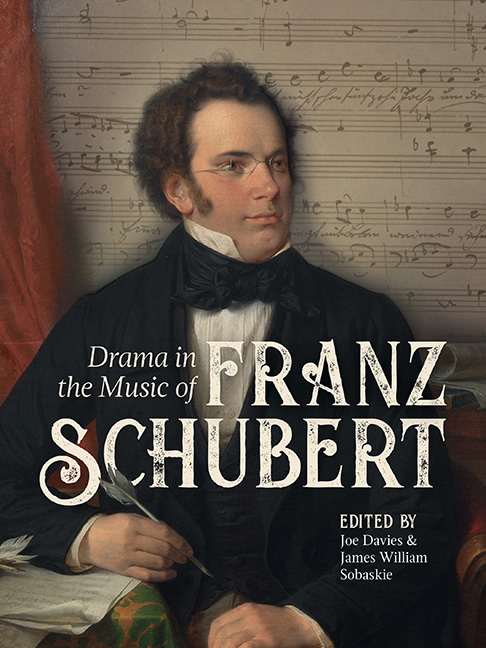Book contents
- Frontmatter
- Dedication
- Contents
- List of Figures
- List of Tables
- List of Contributors
- Acknowledgements
- Preface
- Introduction: Internal Dramas
- PART I STAGE AND SACRED WORKS
- PART II LIEDER
- PART III INSTRUMENTAL MUSIC
- 9 ‘Zumsteeg Ballads without Words’: Inter-Generic Dialogue and Schubert's Projection of Drama through Form
- 10 Lyricism and the Dramatic Unity of Schubert's Instrumental Music: The Impromptu in C Minor, D. 899/1
- 11 Music as Poetry: An Analysis of the First Movement of Schubert's Piano Sonata in A Major, D. 959
- 12 Virtual Protagonist and Musical Narration in the Slow Movements of Schubert's Piano Sonatas D. 958 and D. 960
- 13 Stylistic Disjuncture as a Source of Drama in Schubert's Late Instrumental Works
- Select Bibliography
- Index
10 - Lyricism and the Dramatic Unity of Schubert's Instrumental Music: The Impromptu in C Minor, D. 899/1
from PART III - INSTRUMENTAL MUSIC
Published online by Cambridge University Press: 25 March 2020
- Frontmatter
- Dedication
- Contents
- List of Figures
- List of Tables
- List of Contributors
- Acknowledgements
- Preface
- Introduction: Internal Dramas
- PART I STAGE AND SACRED WORKS
- PART II LIEDER
- PART III INSTRUMENTAL MUSIC
- 9 ‘Zumsteeg Ballads without Words’: Inter-Generic Dialogue and Schubert's Projection of Drama through Form
- 10 Lyricism and the Dramatic Unity of Schubert's Instrumental Music: The Impromptu in C Minor, D. 899/1
- 11 Music as Poetry: An Analysis of the First Movement of Schubert's Piano Sonata in A Major, D. 959
- 12 Virtual Protagonist and Musical Narration in the Slow Movements of Schubert's Piano Sonatas D. 958 and D. 960
- 13 Stylistic Disjuncture as a Source of Drama in Schubert's Late Instrumental Works
- Select Bibliography
- Index
Summary
Introduction
Lyricism and drama do not sit well together in discussions of Schubert's instrumental music. Today it is widely accepted that the main impulse in his writing is ‘lyrical’ – a term that usually is set in opposition to ‘dramatic’, implying a looser, more relaxed approach to the way the music progresses and a privileging of the self-contained lyrical moment over the broader sweep of the work. Yet Schubert's finest instrumental music is also animated by a compelling dramatic process that seizes the imagination of its listeners from the very first bar of the piece and does not relent until all issues and conflicts have been resolved. By ‘dramatic’ I mean that the music projects the continuity of a coherent chain of events moving irresistibly to a final denouement, much like the unfolding of a well-crafted play. Its hold on the listener depends upon consistency in the music's plan and a progressive development of its material in which the implications of initial actions are realized later in the form. I would thus propose that in such instances, rather than being diametrically opposed, drama and lyricism work together effectively to create a unified and engaging whole. Here the overall disposition and relationship of the parts of the form create a powerful dramatic shape or scenario within which lyricism plays a crucial role.
The principal features of lyricism in Schubert's instrumental music include motivic and melodic repetition, the use of variation as opposed to motivic development, and the presence of ‘closed song forms’ within the overall structure. These features have been cast as a brake on the forward drive of Schubert's music and thus deficient in producing a truly dramatic structure. As shall be demonstrated, however, they are not in themselves impediments to the realization of the music's potential as drama, but instead often contribute effectively to that realization. A prime example of how lyricism works within an essentially dramatic conception of form is provided by the Impromptu in C minor, D. 899/1, which shall be the exclusive focus of the discussion that follows here. Before dealing with it in some depth, though, it is necessary first to examine those attitudes towards lyricism and drama in Schubert's instrumental music that have shaped its critical reception.
- Type
- Chapter
- Information
- Drama in the Music of Franz Schubert , pp. 233 - 256Publisher: Boydell & BrewerPrint publication year: 2019

